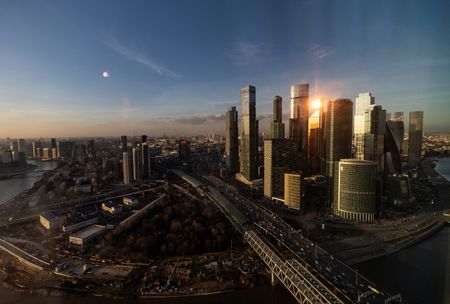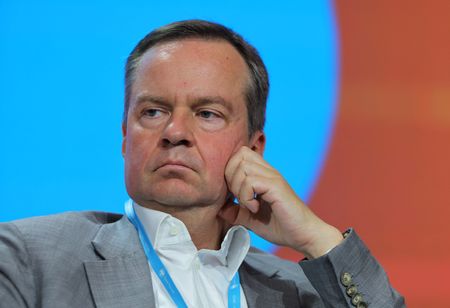By Elena Fabrichnaya
MOSCOW (Reuters) -Russia has no plans to seize any European assets, including companies and banks, but will consider its position if the European Union confiscates frozen Russian sovereign assets, a senior Finance Ministry official said on Wednesday.
As much as $250 billion worth of Russian assets have been frozen in the EU since the U.S. and its allies prohibited transactions with Russia's central bank and finance ministry after Moscow sent forces into Ukraine in February 2022.
EU leaders are discussing ways to use the frozen assets to finance Ukraine's defence and reconstruction without directly confiscating them due to legal issues and amid concerns about such a course of action voiced by the European Central Bank and some EU member states.
Russian Deputy Finance Minister Alexei Moiseev noted Europe had so far avoided outright confiscation of the frozen assets and said Moscow would do the same unless the EU changed course.
"We are not confiscating anything yet. The Europeans haven't called for confiscation, so we won't confiscate anything until they do. If they do end up confiscating, then we will consider it," he told reporters on the sidelines of a conference.
Moiseev also said that a recent presidential decree on the accelerated privatisation of state-held assets was in no way linked to plans to seize European assets.
In the decree, President Vladimir Putin appointed PSB, a bank which serves the military-industrial complex and is under Western sanctions, as the government's agent in state property sales.
The decree also introduced an accelerated sale mechanism, requiring mandatory valuation of an asset within 10 days after a contract for such a valuation is signed, along with faster property rights registration.
The decree text said the measures were a response to "unfriendly" actions by the U.S. and its allies. That prompted speculation that it was designed to help Russia swiftly retaliate if its frozen assets were seized.
But Moiseev said that private European companies and banks that are still operating in Russia had not been seized by the state, and were therefore not subject to the new decree on privatisation.
"Forget about European assets (in relation to the decree). No one is considering or discussing these issues," Moiseev said, arguing that the real purpose of the decree was to create another channel for property sales.
Authorities have seized assets worth around $50 billion since the start of what Moscow calls its "special military operation" in Ukraine, including the assets of fleeing Western companies.
Major domestic companies have also changed hands on the basis of corruption claims, alleged privatisation violations, or due to poor management.
The nationalisations have marked the biggest property redistribution since the 1990s, when Soviet state assets were sold off to private investors at bargain prices.
Russian government officials pledged to find new private owners for seized assets quickly. "There are many assets and they need to be sold quickly," said Moiseev.
(Reporting by Elena Fabrichnaya; writing by Gleb Bryanski; editing by Andrew Osborn and Mark Heinrich)








